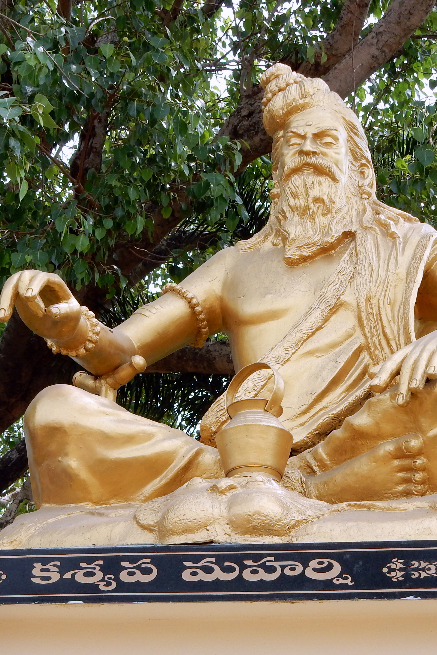Kashyapa


Kashyapa is a revered Vedic sage of Hinduism. He was one of the seven ancient sages (rishi) considered as Saptarishis in Rigveda, numerous Sanskrit texts and Indian mythologies. He is the most ancient rishi listed in the colophon verse in the Brihadaranyaka Upanishad, and called a self-made scholar in the Atharvaveda. He was based in the northwestern part of the Indian subcontinent, and legends attribute the region of Kashmir to be derived from his name.
Kashyapa is a common ancient name, referring to many different personalities in the ancient Hindu and Buddhist texts.Kaśyapa, alternatively kasiiapa, means "turtle" in Sanskrit. According to Michael Witzel, it is related to Sogdian kyšph, New Persian kašaf, kaš(a)p which mean "tortoise", after which Kashaf Rūd or a river in Turkmenistan and Khorasan is named. Others trace it to Tokarian B kaccāp ("brainpan"), Polish kacap (czerep, "brainpan", "hardliner"), Tokarian A kāccap
Kashyapa is one of Saptarishi, the seven famed rishis considered to be author of many hymns and verses of the Rigveda (1500-1200 BCE). He and his family of students are, for example, the author of the second verse of 10.137, and numerous hymns in the eighth and ninth mandala of the Rigveda. He is mentioned in verse 2.2.4 of the Brihadaranyaka Upanishad, along with Atri, Vashistha, Vishvamitra, Jamadagni, Bharadwaja and Gotama. Kashyapa is also mentioned as the earliest rishi in colophon verse 6.5.3 of Brihadaranyaka Upanishad, one of the oldest Upanishadic scriptures of Hinduism.